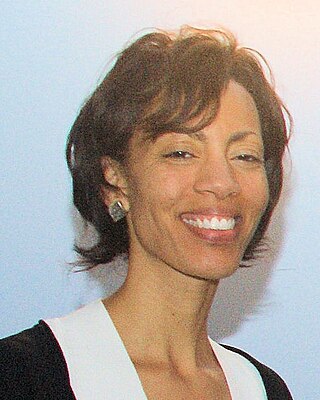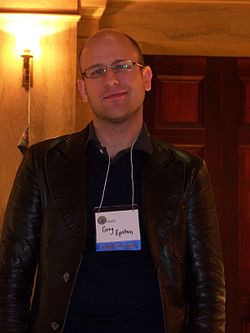Secular humanism is a philosophy, belief system, or life stance that embraces human reason, logic, secular ethics, and philosophical naturalism, while specifically rejecting religious dogma, supernaturalism, and superstition as the basis of morality and decision-making.
Religious humanism or ethical humanism is an integration of humanist philosophy with congregational rites and community activity that center on human needs, interests, and abilities. Religious humanists set themselves apart from secular humanists by characterizing the nontheistic humanist life stance as a non-supernatural "religion" and structuring their organization around a congregational model.

The American Humanist Association (AHA) is a non-profit organization in the United States that advances secular humanism.
Sherwin Theodore Wine was an American rabbi and a founding figure of Humanistic Judaism, a movement that emphasizes Jewish culture and history as sources of Jewish identity rather than belief in any gods. He was originally ordained as a Reform rabbi but later founded the Birmingham Temple, the first congregation of Humanistic Judaism, in 1963.
Humanistic Judaism is a Jewish movement that offers a nontheistic alternative to contemporary branches of Judaism. It defines Judaism as the cultural and historical experience of the Jewish people rather than a religion, and encourages Jews who are humanistic and secular to celebrate their identity by participating in relevant holidays and rites of passage with inspirational ceremonies that go beyond traditional literature while still drawing upon it.

The Society for Humanistic Judaism (SHJ), founded by Rabbi Sherwin Wine in 1969, is an American 501(c)(3) organization and the central body of Humanistic Judaism, a philosophy that combines a non-theistic and humanistic outlook with the celebration of Jewish culture and identity while adhering to secular values and ideas.
Jewish atheism is the atheism of people who are ethnically and culturally Jewish.

The Secular Coalition for America is an advocacy group located in Washington D.C. It describes itself as "protecting the equal rights of nonreligious Americans."

The Humanist Institute is a training program for leaders within the humanist, and secular humanist movement.
The City Congregation for Humanistic Judaism is a Humanistic Jewish congregation and synagogue meeting in the Upper West Side neighborhood of Manhattan in New York City, New York, United States. It is the first Humanistic congregation in New York City to be led by a Humanistic rabbi.
Articles related to philosophy of religion include:

In Belgium, organized secularism is the local associations and organizations which provide moral support for naturalist, atheist, agnostic, secular humanist, freethinking, Bright, or irreligious and non-confessional citizens. A person who subscribes to such entities or ideologies, or at least espouses an interest in "free inquiry" apart from religious traditions is described as a "secular" or "free-thinker".
Yaakov Malkin was an Israeli educator, literary critic, and professor emeritus in the Faculty of Arts at Tel Aviv University. He was active in several institutions that deal with both cultural and Humanistic Judaism.
Tamara Ruth Kolton is an American non-denominational rabbi and clinical psychologist. She was the first person ordained as a member of the Humanistic Jewish movement. Over time, her religious position evolved from agnosticism to a more spiritual perspective that drove her away from Humanistic Judaism. Kolton later became known for her controversial feminist reinterpretation of the Biblical Eve, which has received both support and criticism from other religious and spiritual writers.
Or Emet, officially the Minnesota Congregation for Humanistic Judaism, is a Humanistic Jewish synagogue and congregation in Minneapolis – Saint Paul, Minnesota, in the United States. The congregation is a member of the Society for Humanistic Judaism. It is a community of cultural Jews, secular Jews, Jewish humanists, and other humanists, united by a commitment to humanism and by respect and support for Jewish culture, traditions, and Jewish identity, and by those traditional Jewish values most consonant with humanism — tikkun olam, social justice. Or Emet embraces a human-centered philosophy that combines rational thinking and scientific inquiry with the celebration of Jewish culture and traditions.

Sikivu Hutchinson is an American author, playwright, director, and musician. Her multi-genre work explores feminism, gender justice, racial justice, LGBTQIA+ rights, humanism and atheism. She is the author of Humanists in the Hood: Unapologetically Black, Feminist, and Heretical (2020); White Nights, Black Paradise (2015); Godless Americana: Race and Religious Rebels (2013); Moral Combat: Black Atheists; Gender Politics, and the Values Wars (2011); and Imagining Transit: Race, Gender, and Transportation Politics in Los Angeles (2003). Her plays include "White Nights, Black Paradise", "Rock 'n' Roll Heretic" and "Narcolepsy, Inc.". "Rock 'n' Roll Heretic" was among the 2023 Lambda Literary award LGBTQ Drama finalists. Moral Combat is the first book on atheism to be published by an African-American woman. In 2013 she was named Secular Woman of the year and was awarded Foundation Beyond Belief's 2015 Humanist Innovator award. She was also a recipient of Harvard's 2020 Humanist of the Year award.

Christopher Stedman is an American writer who teaches in the department of religion and philosophy at Augsburg University. He was previously the founding executive director of the Yale Humanist Community at Yale University and a humanist chaplain at Harvard University.
John Figdor is a cryptocurrency fundraiser and former humanist chaplain at Stanford University, where he organized events and programs for students and community members in the San Francisco Bay Area. He was the first humanist chaplain at a university on the West Coast. As a humanist officiant, Figdor oversees non-theistic weddings, funerals, and baby-naming ceremonies.
Oraynu Congregation for Humanistic Judaism, founded in 1969, is Canada's first Humanistic Jewish congregation. It is based in Toronto, Ontario and is affiliated with the Society for Humanistic Judaism.







